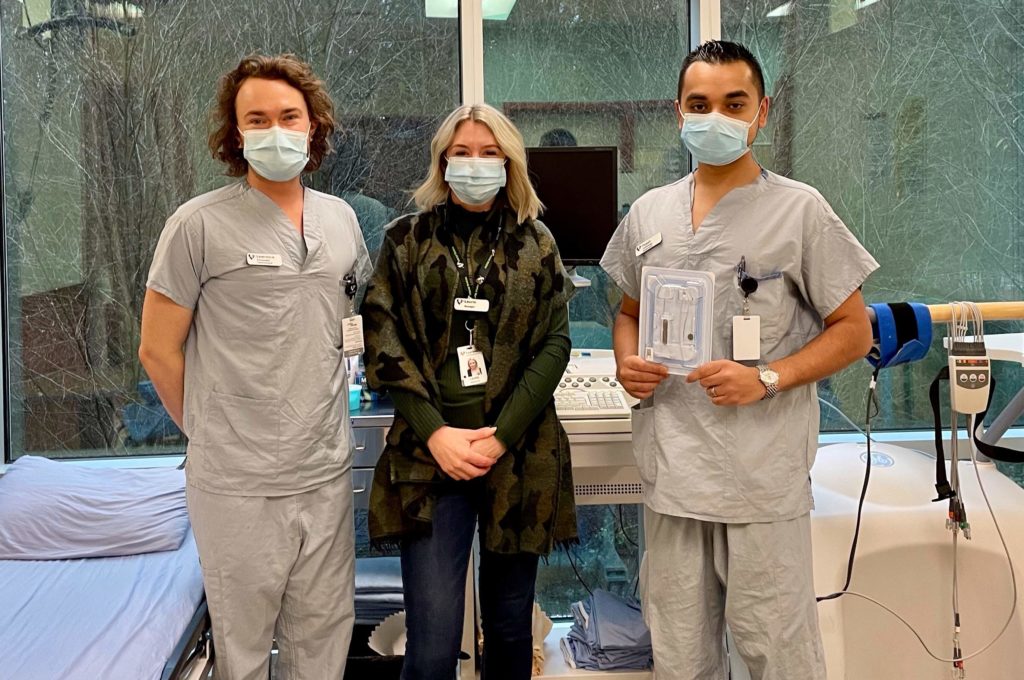
Surrey Hospitals Foundation recently announced an investment of $25,000 to help fund Western Canada’s first injectable loop recorder cardiac monitor project. This project will monitor high-risk cryptogenic stroke patients like Brendan Havisto, using injectable loop recorders, and monitoring them continuously and virtually.
The six-month pilot project is based at Surrey Memorial Hospital and will involve a dedicated care team and patient pathway studying 24 patients who experienced stroke with unknown or undetermined causes. An injectable loop recorder, which is a type of electrocardiographic (ECG) heart-monitoring device that records heart rhythm continuously, will be non-invasively inserted via injection just under the skin of their chest area.
The project includes an implant care team of neurologists, cardiologists and clinicians, as well as cardiac diagnostic technicians who will virtually monitor the hearty rhythm of these patients for signs of atrial fibrillation, or abnormal heart beats.
“The benefit of using these injectable loop recorders is the continuous monitoring of abnormal heart rhythm or arrhythmia, which can cause stroke,” says Dr. Tarun Sharma, Lead Cardiologist at Surrey Memorial Hospital. “This can be tracked and recorded wirelessly and remotely for up to three years and can help medical practitioners better diagnose the cause of their stroke. Our goal is to track results over time and show improved health outcomes in these high-risk patients. With improved outcomes, we can look at pathways to streamline diagnostic testing for such high-risk patients.”
36-year-old Surrey father of three, Brendan Havisto, is one of the first cryptogenic stroke patients who is part of this pilot study. After suffering two strokes last year, his medical team could not find a cause for his condition despite multiple tests and MRI scans. This past week, he had an injectable loop recorder inserted into his chest to track his heart rhythm, and his medical team plans to monitor his progress virtually with the hope of better diagnosing his condition.
“It has been a frustrating year health-wise especially after so many tests, we still don’t know what is causing my strokes,” says Brendan Havisto. “I am lucky that my medical team involved me in this project so that they can use this technology to continuously monitor my condition, which gives me peace of mind so that I can continue to focus on my family and my day-to-day life.”

Stroke statistics:
• Stroke, or a sudden loss of brain function caused by a brain blood vessel blockage or rupture, is the third leading cause of death in Canada.
• Approximately 741,800 Canadian adults aged 20 and up live with the effects of a stroke (2012/13), 365,000 men and 376,800 women.
• One-quarter of Canadians living with stroke are under age 65, and stroke prevalence rises sharply after age 55.
• In the United States, cryptogenic strokes (undetermined causes) account for about 15-40 percent of strokes.
The injectable loop recorders are newer generation devices that are much smaller and inserted into the body via injection which only takes five minutes in a basic procedure room. The older implantable loops recorders are larger, surgically inserted, take longer, require more specialized surgical spaces and incur more patient discomfort.
The Jim Pattison Outpatient Care and Surgery Centre supports 38 per cent of loop recorder patient visits in Fraser Health each year, almost double any other site in the region. We are honoured to have this opportunity to invest this leading edge technology that will help expedite treatment options for stroke patients, as well as reduce wait times for diagnostic tests in the Fraser Health region.
Media Stories


